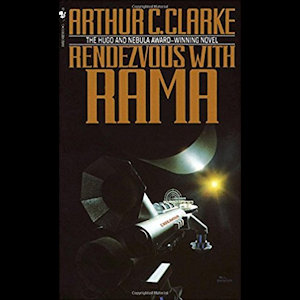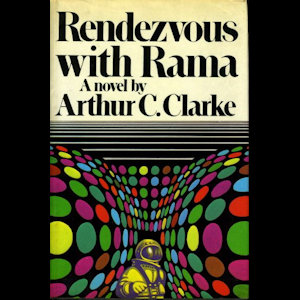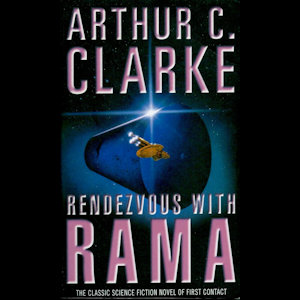The Summer of Arthur C. Clarke: Rendezvous with Rama
Before I begin, welcome to my Summer of Arthur C. Clarke. On the heels of last year's popular Slasher Summer, this year I'm leaving behind the guilty pleasure of the niche horror genre and exploring something a little closer to my own heart: namely science-fiction. Of all the sci-fi greats, none have influenced me more than the late Arthur C. Clarke, my personal favorite of the "Big Three" from the Golden Age of the genre (Asimov, Clarke, and Heinlein). This summer, I am going to look at a few of his most famous works, including the entirety of his 2001 series and the tiny handful of adaptations that have been made for film, television, and video games. Strap in and prepare yourselves for a journey into the stars and the mind, and let us never forget how much richer the world of fiction is for having been blessed by the incomparable Sir Arthur C. Clarke.
 | | My copy's cover is barely holding on |
The work I once classified as the greatest science-fiction novel ever written, Clarke's Rendezvous with Rama is unquestionably my favorite of his fiction. As with most of the books I've looked at this summer, rereading Rama has not diminished my love for it. In fact, as I read it so close to his other works, I've found new ways of appreciating it.
That's because the main thrust of the novel, the exploration of a tiny, inside-out alien world as it speeds towards the solar system, hits a perfect sweet spot for Clarke. It offers a narrative structure that not only permits him to play around with a vast array of disparate science-fiction ideas, but encourages it. Rather than needing to digress from the main narrative to expand upon some neat technological elaboration Clarke has imagined, the main narrative is driven by such digressions. Through Rama, he captures a harmony of mystery and awe that can only be described in modern times as Clarkean.
That alone would make this a notable entry in his canon, but he tops it off with one of his strongest protagonists: Commander Norton. Norton is the even-keeled leader of the Endeavour, a small space vessel that just happens to be the only ship close enough to catch up with "Rama," an object from the interstellar depths that enters our solar system at incredible speed. Not a naturally occurring object, all indications are that this enormous cylinder is in fact our first visitation from extraterrestrial life. It gives no outward signs of its purpose, offers no clues as to its creators or inhabitants, and could be on a trajectory to join the planets in orbit around the sun. Norton, an intelligent and competent man, leads his crew as they land on and then enter Rama, where they discover an apparently sterile alien environment spinning on its axis. As they get closer and closer to the sun, though, Rama begins to awaken.
 | | I don't remember any psychedelic chapters involving spacemen on acid |
Norton is likeable because he isn't just an avatar for Clarke to espouse his personal opinions about society, religion, and such. He is compassionate but not sentimental; thoughtful but not overly opinionated; decisive but humble. While he has a predictably stoic side, his interactions with the rest of the crew feel both warm and genuine, even moreso than the similarly drawn Heywood Floyd from 2010. His mild obsession with Captain Cook gives him some idiosyncracy, and his need to juggle his domestic duties between two distant wives is amusing and relatable.
That said, Norton isn't really the main character here. That would be Rama itself, the giant vessel filled with mystery and bold science. Clarke clearly does his homework to imagine the logistics of something so massive and so old, and the differences between the real science undergirding his ideas with the wild speculations of his vivid imagination are impossible to discern. This is Clarke at his most extreme--technologically speaking--and he fills page after page with fascinating concepts, each of which could make for a unique premise for an entirely separate story.
He also imagines the politics of a solar system where man has begun to conquer more than just Earth, mapping out the difficulties in communication, cooperation, and trade between worlds. A significant source of conflict late in the book comes from the brash spirit of the men and women living on Mercury, and he predicts that people bold enough to conquer such a hostile and valuable world would have a unique society of their own that clashes inevitably with the cooler heads of other worlds. These are ideas he revisits in many of his works, but he never really improves upon the solar politics he creates here.
 | | Read. This. Book. |
Rama ultimately feels surprisingly realistic, even today, in just how unimaginably mysterious alien technology must be and in how human nature evolves over time. People seem at once more enlightened and tolerant, but also just as pig-headed and biased as ever. The future Clarke imagines in this book isn't filled with the utopic visions of Songs of Distant Earth or Childhood's End, but it also isn't a dystopic future on the brink of collapse. It predicts a future where mankind has improved, but still has a long way to go, and that makes for a grounded setting in which Rama can invade and challenge everything.
I'm not sure if I'd still consider Rendezvous with Rama the greatest science-fiction novel of all time, if I'm being perfectly honest. However, it's got to be a contender, because this is a tale that imagines both a believable spacefaring future for mankind but also a wholly convincing take on what first contact with alien technology would be like. Though it hasn't been turned into a film of its own (despite the best efforts of Morgan Freeman and David Fincher), it has been wildly influential over the years in everything from Star Trek to Interstellar, not to mention popular video games like Halo.
There's more to it than just the science-fiction, too. Rama is like an advanced textbook in tone, and countless writers have tried for years to capture the aforementioned Clarkean magic, demonstrated here as a mix of intrigue, creeping tension, an enormous scope, the unknown, silence, and darkness. Movies like Alien and video games like Dead Space aren't shy about tapping into that, despite their heavier emphasis on horror. (The latter's main character is not coincidentally named Clarke.) While 2001 is certainly an influential work (though I'd argue most of its influence has come from Kubrick, not Clarke), Rama is probably the most seminal novel the sci-fi master ever wrote, and it's no wonder why it was the first of only two books to finally earn Clarke the Hugo Award.
If you can only read one novel by Sir Arthur C. Clarke, you must read Rendezvous with Rama. Then come back here next week for a brief discussion of its three primary sequels: Rama II, The Garden of Rama, and Rama Revealed. Clarke never intended to continue the story begun with Rendezvous with Rama, but a tantalizing final sentence captured the imagination of JPL-scientist-slash-writer Gentry Lee. The two of them collaborated for many years to expand upon Clarke's initial concepts and ideas, and they took Rama to places readers could scarcely comprehend.
-e. magill 7/12/2018
THE UNAPOLOGETIC GEEK'S
SUMMER OF ARTHUR C. CLARKE: | |
|
|
|